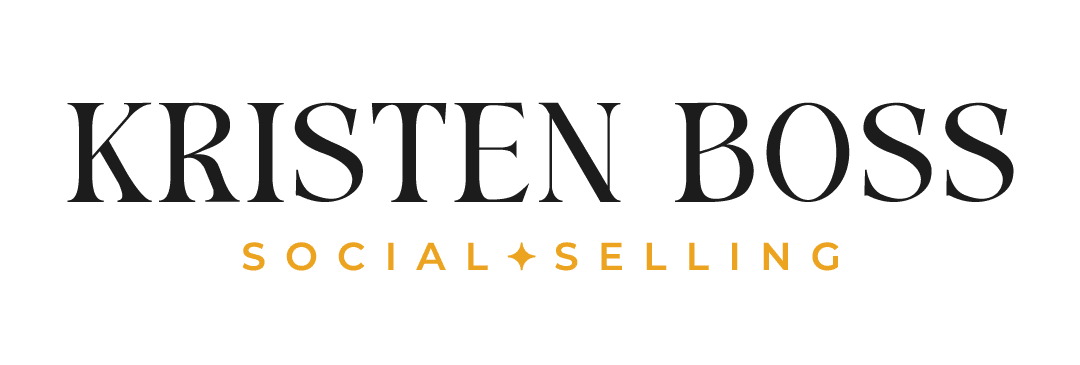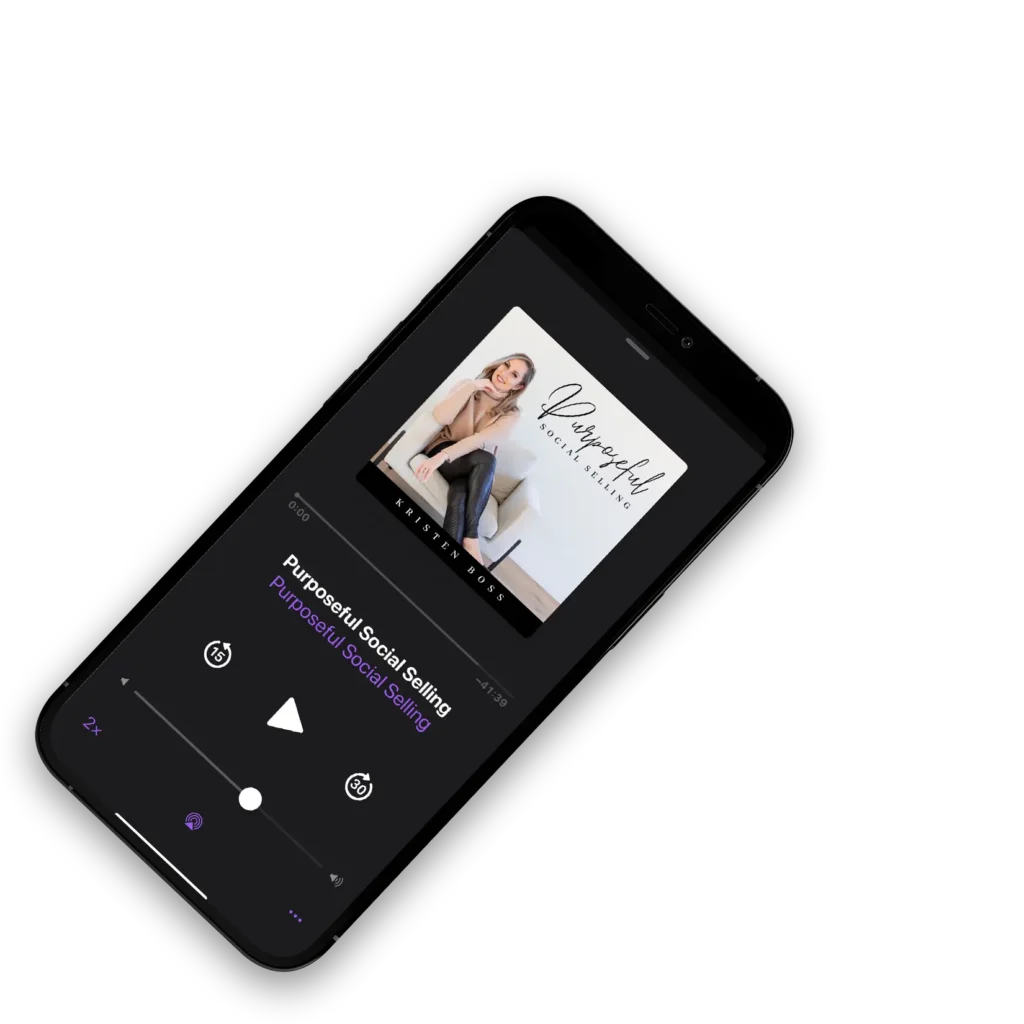Today’s episode may make you uncomfortable, but it’s an important one for anyone in the social selling industry. Kristen lays out some truth bombs about how taking ownership in your business is the key to showing up as a leader and creating massive success.
- Why we need to normalize attrition
- Why you must take ownership of your business outcomes–positive and negative
- Why it’s okay that not everyone has the same finish line in as you
- The natural laws of business growth in the social selling industry
- How to determine what you can control vs. what you can influence
- How your lack of resourcefulness creates dependent team members
- Why systems are the key to creating your leadership team
- How letting go of resentment will allow you to enjoy your residual income
Listen in to learn how you can take ownership and create a team environment built for longevity and self-reliance. You don’t want to miss it!
Thanks for listening! Do you have a question about network marketing? Kristen can help! Drop your question here, and she just might answer it live on the podcast: https://kristenboss.com/question
Connect with Kristen:
Do you have a business full of customers and almost no builders? You’re in need of a reboot! Learn the three skills you can learn that will completely change your recruitment game. Check it out here.
If you’re ready to learn the simple process of running your social selling business online, you have to check out Kristen’s live group coaching program! The Social Selling Academy: www.thesocialsellingacademy.com
Interested in Kristen’s exclusive mastermind for six-figure earners in the network marketing industry? Get all the details and join the waitlist here.
Transcript for Episode #21: Ownership: The Trait of Leadership
Kristen Boss (00:05): Welcome to Purposeful Social Selling with Kristen Boss. I’m your host, Kristen Boss. I’m a mindset and business coach with more than 15 years experience in both the product and service based industry. I believe that social selling is the best business model for people wanting to make an impact while they make serious income. This is the podcast for the social seller, who is tired of feeling inauthentic in their business and desires to find a more purposeful and profitable way of growing their business in today’s social media landscape. In this podcast, you will learn what it takes to grow a sustainable business through impactful and social marketing. It’s time to ditch the hustle and lead from the heart. Let me show you the new way. Hey, fellow bosses, welcome back to another week of the podcast. I hope you all had a fabulous weekend. I am ready to get started. Hey listen, this episode today
Kristen Boss (01:01): Is going to be a hard episode. It’s going to be an episode that might feel challenging. It’ll probably feel uncomfortable, might even feel triggering, but it’s an episode I really feel needed to happen because I see this particular issue, this issue of ownership, getting in the way of people experiencing joy and profit and healthy, thriving business and teams and the network marketing space. I’m going to talk about the things I see holding people back, the things I see creating just roots, like a bitter root of what I think can be destructive culture in this. So sit with me today in this, and I really want you to not listen to this episode, thinking of somebody else. I want you to listen to this episode, taking full responsibility. Actually, I want you to take full ownership of this episode. I want you to only think of yourself and think of how this applies to you and only you, not your upline, not your downline, not your coach, not your students, only you, and it will be uncomfortable.
Kristen Boss (02:40): And so I want to say this this episode, I really want you to know I’m on your side. We have this thing in coaching called same side, coaching that even when I say something to you, that is triggering, you feel emotional. It feels hard. You’re uncomfortable. I’m on your side and where we feel triggered. That is where our growth is. I’ve said that before. So if you feel triggered this episode, I want you to sit with that feeling and ask yourself the question, why am I feeling this? And how might Kristen be right in this? I mean, I love being right. It’s just asking yourself where might there be truth to this? I have a lot of fun in my episodes. This one’s going to feel a little heavy, but I feel like it’s so, so necessary because it is this concept of ownership that I think is causing division hurt, expectation, disappointment, culture problems within teams. It’s, it’s, it all boils down to this. So ownership, real trait of leadership. We’re just getting right into it.
Kristen Boss (04:03): Ownership is what I believe the most important trait you need to have in your business. Specifically with the network marketing model, you joined a very specific business model. So ownership, I’m going to talk about ownership in a few ways today. The first way I want to talk about ownership is owning the business model that you signed up for. Just like with any business model, any nine to five corporate, being an entrepreneur, being, working in a trade, working network marketing, working affiliate. There are pros and cons to both. And often we join one of them because we like the pros a lot. And the network business model, the network marketing business model is very attractive. It really is. And I think it’s a great model because it has the lowest barrier. Your entry, many people can start at a very low cost for building a business. You can choose your hours. There’s a lot of flexibility. There’s no income ceiling.
Kristen Boss (05:18): You can create your own hours, your own time. There’s a lot of amazing perks. And one of the top perks, the reason why a lot of people, it is the idea of residual income. The idea that you put in work that is going to eventually down the road, you are going to live off income. That requires very little work from you. But enjoying that residual income comes with a few things. And actually I’m going to talk about that component different podcast episode, because I see people not even tapping into or enjoying the residual income for a number of reasons, but that’s for another time. But a lot of the reason why people join this is because the income is very appealing. The flexibility is appealing, low barrier entry and the promise of, or the potential of residual income that is attractive to a lot of people.
Kristen Boss (06:20): So what’s going to attract a lot of people. So the first thing I want you to own for you to take ownership of today is ownership of the entire business model. I just named the pros, but in order for you to embrace the model fully, you need to also embrace the cons. It’s just like in marriage, in relationships, we don’t just choose to love parts of the person it’s learning to love the whole of the person. Even despite their shortcomings. My husband loves the whole of me. I love the whole of him, right? So it is important for you in business where you really look at the full picture and take ownership of the entirety of the model. So while there is residual income, while there is flexibility, while there is low barrier entry, while there is no income threshold, there also is the other side because it attracts a lot of people.
Kristen Boss (07:22): A lot of people assume the work is going to be easy. A lot of people join, not realizing it’s going to be hard work. So again, because there’s a low barrier entry, especially if you were below the $500 mark for starting in your business like I would say the industry average is around $200. That’s very low barrier entry. So what allows a lot of people to come in? It doesn’t create a lot of pause or evaluation for them to think. Am I willing to put in really hard work? You think about that at a higher price point, like at a thousand, 2000, 15,000, 10,000, whatever it is, you’re, you’re thinking about that early on, but because it has a low barrier entry, that means it’s going to bring in a lot of people. But that also means a lot of people are going to decide.
Kristen Boss (08:16): It’s not for them. They’re going to decide this isn’t the business model I want. They’re going to come in. It looks really promising. Again, no income threshold, residual income, job flexibility, low barrier entry, because that attracts a lot of people. A lot of people are going to come and then they’re going to realize, oh, this requires work like any other job, but they didn’t sign on thinking that it’s your job. By the way, when you’re talking about the business, to help them see that early on to help manage their expectations. But because of this business model is this way, you’re going to have a lot of people coming. And a lot of people deciding they don’t want to work the business. That’s what comes with the territory. Another thing that comes with this business model is the natural laws of business growth, which means there are seasons of momentum and there are seasons of attrition.
Kristen Boss (09:10): And there are seasons of stabilization where you’re stabilizing your business and you’re not really losing, but you’re not really growing. That’s when you’re actually working a lot on your backend, your systems or customer service, your support, but we have to normalize attrition. It’s what happens in this industry, any subscription or monthly order industry deals with attrition. All of them. Netflix, Amazon, Fab Fit Fun, Hello Fresh. Even in coaching communities, membership, it’s just what happens. So realizing people leave, people join and people decide, I don’t want it. People will join and work really, really hard and burn themselves out and quit some come back. Some don’t it’s also important for you as a, as a team leader to help prevent burnout. Because if they don’t burn out, they stay longer. Okay.
Kristen Boss (10:08): Low barrier entry, which means a lot of people come, but also a lot of people leave, right? Attrition happens. There’s also two more things. So attrition: people quit people, people stop. There is no rule in this business about when someone decides to step away and enjoy residual income. I think there’s a lot of assumptions that when someone joins and they’ve decided to work their business and they work really hard for three years and they get to a certain income in their company, it’s almost like there’s this taboo thought or idea or culture of like, you’re not allowed to do that until you get to the top or when is enough enough. So part of the business model means people are going to decide when they want to enjoy the residual income. And it might be, if it’s your upline, your upline might decide to do that sooner than you do.
Kristen Boss (11:15): This is the business model you signed up for. Okay? That means not everyone has the same standard or the same finish line. Some people are truly going to join and they just want to put in enough to have their products covered once a month or just their mortgage payment. Like I just want my mortgage covered. If I can just work hard enough to just have that covered for a long time and just kind of come in every now and then, and do that. People are going to do that also knowing so people will quit. People will stop. And then also people take breaks. This is this in the business model, you cannot take this out of the business model. The reason they joined this residual income is also the reason why they’re going to stop residual income. And you have to be okay with that just because they stopped before you did doesn’t mean it’s wrong.
Kristen Boss (12:13): And I’m- I know I’m really pushing a lot of buttons here. Now I do have thoughts on stewardship. I do have thoughts on customer care. I do have thoughts on that, but I’m talking about people will quit. People are going to disappear. People are going to decide to cash in early. It happens in this business. Another one is people leave and they switch over people. There are people who are lifetime network, marketers who go from company to company, to company, to company. They’re always bouncing, looking for the next best comp plan. The company who’s about to go ground floor. They want to be the early founder. There are always going to be people who look for that and that’s okay. Some people just do that. Okay. So attrition happens. I’m going to keep saying this because I think it’s really important. You hear that it’s normal. It comes with the territory. People quit, people, stop people, take breaks and people leave. It’s what you signed up for. This is the, all the territory that comes within this business model. So today I’m asking you to not just own the parts you like, but I want you to take ownership in the territory that comes with this business. All that comes with this and realizing you signed up for this, the good, the bad, the ugly, the best you signed up for it. Okay?
Kristen Boss (13:51): I want you to take ownership of the business model. The second one I want you to take ownership of is I want you to take ownership of your outcomes, your positive outcomes, your negative outcomes, the outcomes you want and the outcomes you don’t want. This is about you taking ownership as a leader for yourself and not delegating or outsourcing your success to the involvement or availability of your upline or the motivation and desires or hard work of your downlines. Now that’s not me saying, ignore your downlines. It’s me saying, what would it look like for you to take full responsibility for yourself, your actions, your thoughts, your feelings, your results, because truly that is the only thing you can control. You can’t control the company comp plan. You can’t control the products. You can’t control the things that the company decides you can control what your upline does, what your downline does. You’ve learned at this point that you cannot control it. However, you can influence your upline and your downline in a positive or negative way. But this is about you taking ownership. And this is where I see people not taking ownership.
Kristen Boss (15:26): There’s a lot of blaming and victim mean feelings. Victimy feelings around their success and their failures. If they have success and they feel like they’re out there, upline didn’t do much to help them. It breeds seeds of resentment. It’s this feeling of like, well, my upline is profiting off of my hard work. Well, yes. Again, owning the model own the business model. In this moment, you signed up for this. You cannot determine when you’re, what you’re applying does. The same thing is you’re also profiting off of the performance of your downline. It’s the same thing. You can’t just choose the things that only work in your favor, or I would be further along, or I would have hidden that hit that rank. If my upline was more available for me, if she was more involved, if she was more helpful, if they were more helpful, maybe it’s a, he, you have this story that your success is on.
Kristen Boss (16:25): All of these factors that are totally outside of you. Your company comp plan, the branding of your company, where your company’s going, your upline, your team, your downline, your sidelines, social media. It’s like all these things you believe are what determines your success. And I’m actually saying to you, the most successful and healthy leaders are people that do not look to those things to create their success. They look at themselves, what am I responsible for? What decisions can I be making? What can I do differently? There are two really important qualities or traits you need to have. If you are taking ownership as a leader for yourself, if you’re taking cell phone ownership, this is what it looks like. No matter if you have a big team, small team, or you just started the first one is you being resourceful, not looking to others, to always answer your questions, don’t be lazy.
Kristen Boss (17:31): Get resourceful, go look, Google it. See where you need to find the answer. Look up in the corporate pages, Google here, just because you’re frustrated and wanting an answer, don’t go straight to asking your upline or asking your sideline or asking somebody to find the answer for you. Learn how to find the answers. Because right now, while you are being the one that’s asking all the questions and your upline’s answering all the questions. And we’ll talk about that. If they’re answering your questions at the drop of the hat, and you’re never going and looking for the answers, you are not becoming resourceful. And the problem with that is is when you are not resourceful, when you have not learned to be resourceful, you are not teaching that trait to your own leaders, that you will recruit yourself. And let me ask you, do you want self-reliant and resourceful leaders, or do you want to be at their Beck and call all the time and them upset with you when you don’t get back to them soon enough, you want to teach resourcefulness, but you must first be resourceful yourself.
Kristen Boss (18:45): Is it going to take a little bit longer at first? Yes. But then next time is going to be a lot quicker resource for less forces. You’re learning. It forces you to show up in a certain way. Okay? It is not your upline’s responsibility to provide all of your resources to you at your Beck and call whenever you want. I get your first 30 to 60 days. There’s a lot of handholding that’s normal. And as it should be beyond that, if you are beyond the first 60 days in your business, I want to challenge you about your thoughts on resourcefulness. Are you being resourceful? Are you being self-reliant or reliant on everybody else? And therefore you’re always pausing and blaming others for your results or lack of results. So resourcefulness, the second one is responsible. Being responsible to yourself. You holding yourself fully responsible for your decisions, your actions, what your doing, right?
Kristen Boss (19:52): Choosing to be fully responsible and all things. Now, this ownership where it’s like take charge for yourself and not look to your upline, to be your savior in this, not looking to your upline as the measure of their availability and the measure of their their, yeah. I’m going to say the measure of their availability equally in the measure of your success. Not buying into that story, because that is a story you’re telling yourself, and it’s simply not true, but also I’m going to challenge you and say, but you as a leader, what would it look like for you to feel ownership in creating and putting the things in place to help your team become self-reliant resourceful and responsible themselves. But you have to be that first. This is where leaders get burnt out because they don’t teach those traits to their teams. So they teach that they’re always available on the subconscious level. They end up sending the message I’m always available at anytime. I’ll get back to you and they’re on their phones, twenty four seven all the time and not having any time, freedom that they signed up for, because they don’t have a team of self-reliant resourceful, responsible leaders who feel fully responsible for their own results.
Kristen Boss (21:20): So how can you help create this environment for your team? Well systems. That is how you are able to step away, step back and put systems in place so that it becomes the resource. And not you. If you are the resource, then you don’t have a strong enough system. It’s one thing for you to be a leader and for you to be an encourager. It’s another thing. If you find yourself being someone’s resource 24 7, if you are someone’s resource, this tells me you need a stronger and better system. That’s how you are able to systems. Aren’t sexy. I get it. It is not fun to say, you know what? It sounds like fun today is working on my systems, or maybe some of you have been grinding and hustling so hard for so long and having a lot of results or a lot of momentum that there just, hasn’t been a moment to pause, to create a system. And suddenly you are on your phone, twenty four seven. You are the resource because a system was never put in place. So systems helps ensure that your leaders become self-reliant resourceful and responsible and taking ownership for themselves. So putting in a system, although not sexy is necessary.
Kristen Boss (22:47): So I know you probably didn’t want a systems talk today, but it is so necessary because that allows you to step out of managing in, into leadership. I challenged one of my students, not too long ago, who’s still on my group program. She has a team and she’s, she’s working to double the growth of her team, hit the six-figure mark and her business for the year. And I told her, one day, I said, your job is not to manage this rank of team. Your job is to build this rank of team, getting her out of management mind and into building mind, completely shifted her thoughts. And she realized 80% of her time, she was managing a team rather than growing a team. And you cannot grow a team. If you’re too busy, managing them, managing their feelings, managing their thoughts like you and you alone are managing or responsible for managing your thoughts and feelings and actions and your team, the downline they’re responsible for themselves. Again, it’s this ownership. If you teach, if you embody ownership for yourself, you can teach ownership to your downline.
Kristen Boss (24:07): Cause let me tell you, when we’re not taking ownership, it’s a breeding ground for resentment. It’s a breeding ground for victim stories. It’s a breeding ground for talking about check collectors and how you feel owed how you have felt wronged, how you would be further along if it were not for her or her or this or that. Like you cannot grow from a resentful mindset. You being resentful is keeping you from being resourceful. I see this with all the love, but you have to stop telling yourself the story that the results are outside of you outside of your control, because that’s truly miserable. Think about that. If you believe your success is based on your upline, your downline, your comp plan, the company, and everything outside of you, then you truly feel like you can’t create results and you’re stuck. And that’s just not the truth.
Kristen Boss (25:10): What can you control? You can control your thoughts. You can control your feelings. You can control your actions. Take deep ownership of yourself. Also take ownership of your team in a, in a non scarce hustley place, not from the place of fearing that they’re going to up and leave you one day where you’re gripping your team with such a tight grip that they feel suffocated by your micromanagement, because you’re terrified. Someone’s going to leave. The best leadership is with an open Palm where you are open to what is going on. Like you’re not white knuckling, everything. You’re not white knuckling, your team’s decisions, white knuckling, your own decisions, white knuckling, the end of the month. If you’re white knuckling, you need to be asking yourself some questions like where do I believe that I am not in control? Where do I believe that my success is totally something outside of my control?
Kristen Boss (26:10): So taking ownership of yourself, take ownership of your team and in the sense that your job is to protect them from experiencing burnout. So be mindful of the promises. You promise them when you onboard them, make sure that their expectations are in check, help, keep their minds healthy in their long-term growth. Like are you constantly pushing your team every single month that will exhaust your team? That’s when you will have people that suddenly disappear on you. Those rock stars that were working for a couple of years, they were doing great. And then they just disappeared. And it’s really hard. They don’t even want to touch the business anymore. That’s why always be gauging the emotional and mental health of your team and emotional, like emotionally healthy and mentally healthy teams have long-term mindsets. They celebrate the process. There’s a winning culture in the sense of like they celebrate small things, they celebrate each other. And there is the story of everybody is responsible to themselves, themselves alone. And they take healthy responsibility with their downlines and turning them into self-reliant resourceful and responsible leaders.
Kristen Boss (27:37): Going back to own the model you signed up for. If somebody decided if you’re applying and this happens a lot in many companies, if your upline has decided that they want to sit back at the season in their life and they put in three years of really hard work and they want to enjoy their residual income, okay? Let them, you’re responsible for yourself. Who else can you plug in with? And let me tell you something, the moment you choose to be a victim in that story, a victim in that circumstance, and you choose to be resentful that they are quote cashing in on all your hard work. That’s not you taking ownership of the business. You signed up for. It is what it is. Don’t be resentful that they found. You told you about it. And you said yes to the business and the outcome they wanted for themselves. It looks different than yours.
Kristen Boss (28:39): Like there’s this term, you know, in that I hear all the time, these, these check collectors, and it said with such resentment, my upline’s just a freaking check collector. I want you to notice the tone and the feelings in your body when that’s happening. Can you really move to this authentic servant hearted place with people? When you have that level of resentment and anger in your heart, what would it take for you today to release that resentment? It’s a bitter root that will spread in your team. And if one day you decide to sit back and enjoy your residual income that you’ve worked really hard for. If you do not resolve this resentment, you have right now down road, when you decide to enjoy resent your residual income, you will not allow yourself to, because you will feel like you are on moral high ground because of the story you told yourself about your upline. It will keep you from enjoying your own residual income down the road because of the story you told yourself that it’s wrong to do that. Now I get stewardship. I get that. I get customer service. I get stewardship. And that’s important by the way, systems is one of the best forms of stewardship. If you do this, right, like you can enjoy time freedom being in your business with minimal touch points, checking in with your key people and not being a micromanager mode all the time.
Kristen Boss (30:38): So what will it take for you to change the narrative that you have about your business? Where are you not taking ownership? And I know this probably feels so uncomfortable for you, but it’s also, what’s in the way of your growth. You literally cannot grow when you have the weed of resentment that will choke any growth that you experience. It will, it is not serving you. You being angry and entitled is not serving you. So today I’m going to bring it back and say, Hey, this is about you. I’m challenging you to sit with these thoughts and evaluate yourself, not sit there and think, oh, my downline really needs to hear this. Or my upline really needs to hear this. Nope, this is only for you. And if you start to take ownership in all these things, I told you, you will experience so much emotional freedom and joy in this business because you are taking it for what it is instead of fighting what you want it to be.
Kristen Boss (31:48): Just embrace the parts about it, that you might not like, because when you’re so busy, resisting those parts and thinking you’re wronged, you can’t enjoy the growth of the good parts of this business model. Again, it’s a great business model, but it’s time to be honest with yourself and just check-in and ask yourself in what areas am I resistant to? What was just brought up on this podcast episode? What’s interesting is I’m not sure anybody’s talked about this, but I see that this is what gets in the way of relationships and growth. And if you switch that narrative, if you let that story, you have that story. You have, you need to let it go. If you let it go, you will experience so much freedom, emotional freedom in your business. And when you do that, you will allow for massive growth.
Kristen Boss (32:48): And as always, thanks for tuning in this week, guys. We will catch you next week. That wraps up today’s episode. Hey, if you love today’s show, I would love for you to take a minute and give a rating with a review. If you desire to elevate the social selling industry, that means we need more people listening to this message so that they can know it can be done a different way. And if you’re ready to join me, it’s time for you to step into the Social Selling Academy, where I give you all the tools, training, and support to help you realize your goals. In the Academy, you get weekly live coaching so that you are never lost or stuck in confusion. Whether you are new in the business or been in the industry for a while, this is the premier coaching program for the modern network marketer go to www.thesocialsellingacademy.com to learn more.










